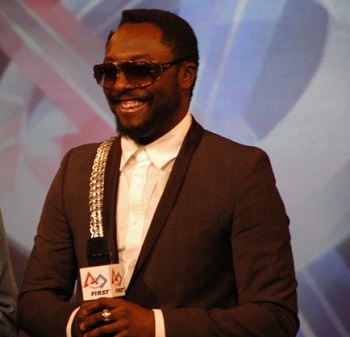The musician and performer has now announced the latest version of his smartwatch, which is voice-activated.
Will.i.am has now announced the latest edition of his wearable technology device, with a voice-activated smartwatch headed to the United Kingdom which, he claims, will rival top options such as the Apple Watch and the Samsung Gear line.
The musician is far from the only one who has stepped into wearables, a category that is struggling for acceptance.
Indeed, wearable technology is growing and there have been some huge names thrown behind it, but many companies and celebrities, including Will.i.am (whose real name is William Adams), have yet to reach the point in which they could genuinely call themselves successful in this area. That said, it looks as though Will.i.am still has a few tech tricks up his sleeve (and around his wrist) as he has now come out with a new voice-activated smartwatch that can send texts and emails, play music, track fitness and allow users to search for information. This particular device also has a front-facing 2 megapixel camera.
This wearable technology stands out from the smartwatches from Apple and Samsung as it doesn’t need a smartphone.
 Unlike its top rivals in the wearables industry, Will.i.am’s smartwatch doesn’t need to be paired with a smartphone in order to be able to use all its functions. Most smartwatches need to be wirelessly paired to a smartphone in order to send and receive texts, access WiFi and notify the user that a call is coming in. That is not the case, here. This device is powered by 4G by way of a SIM card.
Unlike its top rivals in the wearables industry, Will.i.am’s smartwatch doesn’t need to be paired with a smartphone in order to be able to use all its functions. Most smartwatches need to be wirelessly paired to a smartphone in order to send and receive texts, access WiFi and notify the user that a call is coming in. That is not the case, here. This device is powered by 4G by way of a SIM card.
The singer explained that “It is not tethered to a device, it is the device.” He pointed out that “The reason we built the platform this way is that it is for areas you are truly mobile – in the gym, in a car, on a bike, on a hike, areas where the phone really isn’t meant for.” He underscored the fact that while a smartphone is fine in many circumstances, it simply doesn’t fit in others, such as at the gym or while riding a bike through the streets of New York City.
The musician has secured a mobile phone partner in Three, for his wearable technology. The smartwatch will be available in the U.K., starting in early April.
Tourists head to the ivy league university every day and now they are seeing it in a whole new way.
Harvard has now launched a new official university tour app that uses augmented reality technology and other features to provide visitors with an enhanced version of the more traditional form of audio tour that is often seen in museums.
The new mobile app is called the Harvard Official Mobile Tour and is currently available to tourists.
This application represents the first project that was taken on by PIVOTtheWorld, which is a startup operating out of the Innovation Lab at the university. Visitors to the campus simply need to download the mobile app, install it and launch it. Then, when they point their device at any of the 23 different applicable “pivot points,” that is, landmarks throughout the Harvard grounds that have been selected to be a part of the tour, they can learn about those spots through augmented reality features.
The augmented reality app lets a visitor see what the pivot point looked like, back in time, when it was new.
 The pivot points are typically buildings or statues, some of which date back by centuries. Some of the old images are photographs, while others are paintings, as many of the pivot points are much older than photography. The idea is to be able to use the AR technology to be able to look at the way that specific place has changed over the years, while the visitor is able to learn more about what they are seeing.
The pivot points are typically buildings or statues, some of which date back by centuries. Some of the old images are photographs, while others are paintings, as many of the pivot points are much older than photography. The idea is to be able to use the AR technology to be able to look at the way that specific place has changed over the years, while the visitor is able to learn more about what they are seeing.
PIVOTtheWorld is a company that was first founded by husband-and-wife team Asma Jaber and Sami Jitan, following the death of Asma Jaber’s father. Her father, originally a Palestinian, moved to the U.S. in the late 1960s. Jaber was raised to hear the stories of the world he had first called home. When he died, she had only recently graduated from the John F. Kennedy School of Government at Harvard. Despite the fact that she had lived her life in rural South Carolina and then went to university at Harvard, she said she “grew up with a vivid image of Palestine.”
Her husband, Jitan, is an anthropologist. Also a descendent of a Palestinian family, he shared in her passion for cultural history. It was that common enthusiasm for the subject that led to the formation of PIVOTtheWorld and the development of augmented reality experiences that would allow people to see more than what is in front of their eyes when they visit a place of historical significance.
 Unlike its top rivals in the wearables industry, Will.i.am’s smartwatch doesn’t need to be paired with a smartphone in order to be able to use all its functions. Most smartwatches need to be wirelessly paired to a smartphone in order to send and receive texts, access WiFi and notify the user that a call is coming in. That is not the case, here. This device is powered by 4G by way of a SIM card.
Unlike its top rivals in the wearables industry, Will.i.am’s smartwatch doesn’t need to be paired with a smartphone in order to be able to use all its functions. Most smartwatches need to be wirelessly paired to a smartphone in order to send and receive texts, access WiFi and notify the user that a call is coming in. That is not the case, here. This device is powered by 4G by way of a SIM card.
 The pivot points are typically buildings or statues, some of which date back by centuries. Some of the old images are photographs, while others are paintings, as many of the pivot points are much older than photography. The idea is to be able to use the
The pivot points are typically buildings or statues, some of which date back by centuries. Some of the old images are photographs, while others are paintings, as many of the pivot points are much older than photography. The idea is to be able to use the 